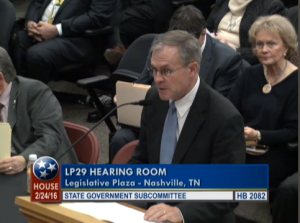Model public records policy to be developed under proposed bill
State Rep. Bill Dunn, R-Knoxville, presented an addition to state law Wednesday that would require each government entity in Tennessee to adopt a written public records policy and designate a “public records coordinator” who would be the “go-to person” understanding the policy and how things are carried out.
His bill, H.B. 2082, also requires the Office of Open Records Counsel to develop a model best practices and public records policy that local and state government entities can use.
The bill passed out of the House State Government Subcommittee on Wednesday with an amendment proposed by Dunn that would move the deadline for government entities to adopt the policy to July 1, 2017, instead of Jan. 1, 2017. The amendment also allows the Advisory Committee on Open Government, a 14-member committee made up of government, citizen and media representatives, to meet and provide comment on the draft policy and practices developed by the Office of Open Records Counsel before they are adopted.
“A lot of times we run into problems with open records because each county and city, they kind of come up with their own rules,” Dunn told the subcommittee. “And sometimes, it changes as things go along.”
The bill calls for every governmental entity:
“to establish a written public records policy properly adopted by the appropriate governing authority. The public records policy shall not impose requirements on those requesting records that are more burdensome than state law and shall include:
(1) The process for making requests to inspect public records or receive copies of public records and a copy of any required request form;
(2) The process for responding to requests, including redaction practices;
(3) A statement of any fees charged for copies of public records and the procedures for billing and payment; and
(4) The name or title and the contact information of the individual or individuals within such governmental entity designated as the public records request coordinator.”
The bill also moves into the Tennessee Public Records Act some exemptions found in other parts of the law that makes confidential individuals’ Social Security numbers, driver’s license numbers, passport numbers and tax identification numbers. It adds “unique biometric data, such as fingerprints, voice prints, retina or iris images, or other unique physical representations” and “unique electronic identification numbers, addresses, routing codes or other personal identifying data which enables an individual to obtain merchandise or service or to otherwise financially encumber the legitimate possessor of the identifying data.”
Essentially, Dunn said, the purpose was to expand the list to individual information that government may have in their records “that you don’t want the bad guys to collect to steal your identity.”
State Sen. Richard Briggs, R-Knoxville, is carrying the companion bill, S.B. 2033, in the Senate.





